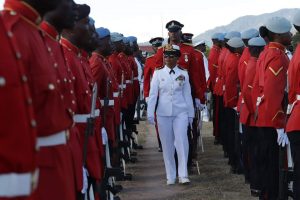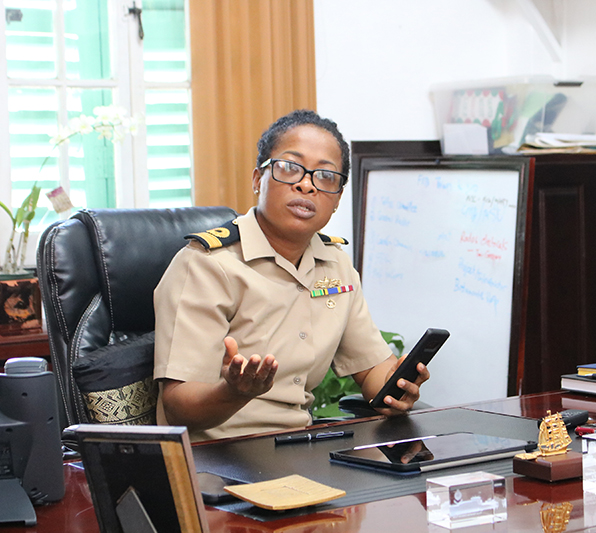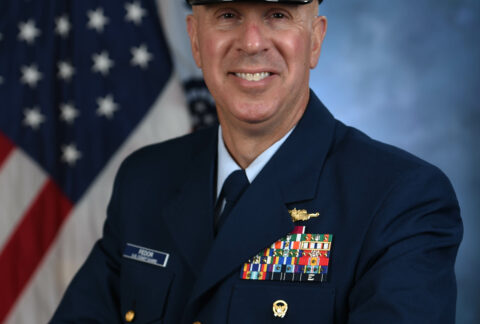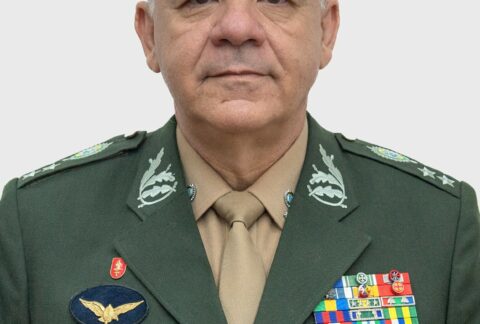As the first and only female flag officer/general officer in the Jamaica Defence Force (JDF), Commodore Antonette Wemyss-Gorman hopes to inspire women to follow in her footsteps.
The child of a single mother, Cmdre. Wemyss-Gorman grew up with her grandparents in rural Jamaica, yet made the surprising choice of joining the Coast Guard, miles away from her home. Upon graduating from high school, Cmdre. Wemyss-Gorman headed to Kingston to attend university, where she first heard about JDF, considered a military career, and joined in 1992.
Nearly three decades later, Cmdre. Wemyss-Gorman reached the rank of JDF Force Executive Officer and second in charge to Lieutenant General Rocky Meade, JDF chief of Defence Staff. To talk about her trajectory, Diálogo visited Cmdre. Wemyss-Gorman’s office at JDF’s headquarters in Kingston.
Diálogo: What did the JDF look like when you first joined, in 1992?
Commodore Antonette Wemyss-Gorman, JDF Force Executive Officer: When I joined the JDF there were only a few women in the officer corps. A little bit more in the enlisted, but in the officer corps you could literally count the number of women who were in the force on two hands. And all of them were employed in support roles. I didn’t join with the idea that I was going to do an office job. I thought, “Wow! I can kick doors and do things — that’s why I’m joining the JDF”.
Diálogo: Does your determination come from being the daughter of a single mother? Does that play a role?
Cmdre. Wemyss-Gorman: Yes, I think it does. And it still influences who I am, but I didn’t grow up thinking that there was something that I couldn’t do. I was completely oblivious to the fact that I came from very humble beginnings or humble circumstances. I thought that I was really rich, because I was made to think that I could do whatever I wanted to do.
I had the opportunity to go to a really good school. Telling me that I could not do something was foreign to me, even though I was from rural Jamaica and grew up with my grandparents. They never told me or let me think that there was something that I couldn’t do. As a child I would do a lot of stuff. I was allowed to be me. I was a tomboy. I would go miles away from home on bicycles with a group of boys, and I was fine.
Diálogo: Would you say that the JDF was sort of a boys’ club when you first joined?
Cmdre. Wemyss-Gorman: I wouldn’t say it was a boys’ club. I would rather say that JDF had not yet matured enough to understand or to develop the policies that they needed around making woman achieve as much as they can today. At that time, although they had made the decision to include women as part of the force, there weren’t any concerted policies around how women were employed.
Diálogo: When did this change?
Cmdre. Wemyss-Gorman: It was not until much later. The chief of staff at the time I joined [1992] was Admiral Brady, who was a Coast Guard officer, and he was quite open to the employment of women and diversity in the employment of women in the force. It did not transfer into a policy then. In fact the JDF did not do a strategic review until 2006 and I joined in 1992, and even at that time there was no focus on gender per se or employment of women.
But gradually as women went into different areas and proved that they were able to do it, the leadership of the force became more open to considering how they would employ women in nontraditional roles. So now we have women serving pretty much everywhere. I think the last place was our counterterrorism operations group, and we’ve had some women who have done the basic training this past year [2019].

Diálogo: But still you are the only flag officer in the entire force? Do you consider yourself as a trailblazer?
Cmdre. Wemyss-Gorman: A door opener, because I insisted and I ended up in the position of really catalyzing the movement of women up the ranks, where it was previously thought that there were ceilings. So certainly when I joined, the promotion process for officers in the force was separate for women. Women did not have the opportunity to matriculate to the rank of field officer because they were not made to do the requisite exams. So they were stopped at captain. It was because they weren’t seen as persons who would command. Even though they did have the basic training at the platoon commander level, they were not employed in a platoon, and so would not have had the opportunity to matriculate to be a field officer, a commander, and so on.
When I joined, I went to the Coast Guard. It was an anomaly. There was nothing else to do at the Coast Guard, but go to sea. There was probably one staff officer in the headquarters that did not go to sea at the Coast Guard who was an admin officer. I clearly was not there to be an admin officer because I had gone and done my naval training.
I just automatically ended up doing the same thing guys were doing. I had to pass my exams, I had to go to sea and carry out all of the same things they did. And so, that kind of opened the door for other women to go.
Diálogo: Since you assumed this role, have you changed anything in terms of taking advantage of the talent pool as a whole, regardless of gender?
Cmdre. Wemyss-Gorman: Having gotten a seat at the table and being in command of my own ship, then unit, and then brigade, I’ve had the opportunity to articulate my position. I would not take credit for it, though. Lt. Gen. Meade has had at the top of his agenda gender optimization in the force. He is very big in the United Nations’ Women, Peace and Security [WPS] agenda. So successive chiefs in the past decade, I would say, have really advanced the opportunities for women in the force.
In my command, I definitely provide equal opportunity for both men and women. I try to mentor the women, not just in my unit but force-wide. We used to have what was called a woman’s unit, but I didn’t want a woman’s unit. We were not separate.
So you can appoint someone who is in charge of gender affairs — that’s kind of something I started to push before the WPS agenda came about. I refused to be labeled as the woman in charge of women’s affairs. I said there are no women’s affairs, it’s service persons. I always insisted on being treated equally and not to be recognized; women should not be recognized because of their gender, but because of their competence, their qualifications, and their rank.
Diálogo: Women’s International Day was this week. Do you think it’s still important to celebrate this day?
Cmdre. Wemyss-Gorman: There are still countries, there are still organizations that are very male centric and not sensitive to the issues or the advantages of gender equality, or optimization as we call it in the JDF. I certainly have had many experiences across militaries worldwide that I’ve interacted with. So there are a range of experiences still there in the military and in civil society, and I think there are still ways to go for some countries and some people. So it is still important.
Diálogo: What unique talents do women bring to the table when it comes to security forces?
Cmdre. Wemyss-Gorman: I think we bring a different perspective. Women tend to employ more emotional intelligence when they’re dealing with issues of command and control. And that’s different from the normal approach of a very hierarchical, strict organization. So they bring a different kind of leadership style, most times— just the perspective and different skills. Women become useful in scenarios and spaces of a security nature that perhaps militaries did not think about in the past.
Certainly, now larger militaries are finding women in special operations extremely useful and contributing to mission success much more than they ever thought. We used to look at the military and military persons for their ability to be hard, tough, and physically aggressive, and that is not the kind of world and security threats we now face, which require very flexible, very nontraditional, very different approaches to the problems. So I think what women bring most to peace and security is a different dimension and approach.
Diálogo: What defines success for you or what talents do you need to be successful regardless of gender?
Cmdre. Wemyss-Gorman: I suppose for me, failure is just not an option. And to be successful at what you do you have to first be competent, be passionate, and be determined. There have certainly been times at sea when I thought, “What am I doing? Why?” But in the end, you fall back on the fact that you’ve made a commitment; you don’t have the option to fail, and you are going to get it done, you are determined to get it done. And those things will pull you, will cause you to be successful. Certainly, as a military person, you have to employ a lot of self-confidence and discipline, and you have to be competent at what you do.
Diálogo: If you could change one thing to make the lives of women in the military easier, what would that be?
Cmdre. Wemyss-Gorman: I think the one thing that would or could cause the lives of women in the military to be easier — which is happening in some cases — would be to have them have a seat at the table where decisions are being made. I guess that’s the biggest thing.
Diálogo: What legacy do you want to leave for your successors?
Cmdre. Wemyss-Gorman: If you can demonstrate competence and hard work, people have to hear you, have to see you, have to give you the opportunity. If the opportunity does not readily present itself, make it, and take it.









